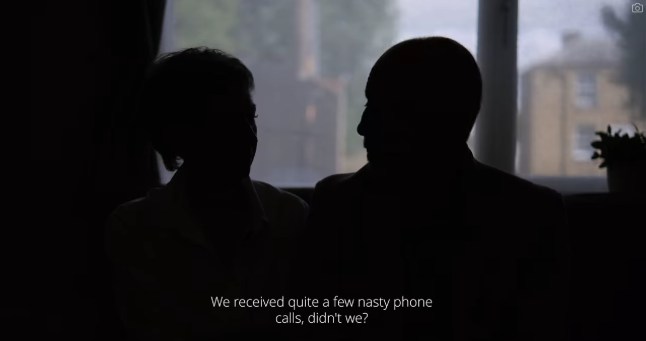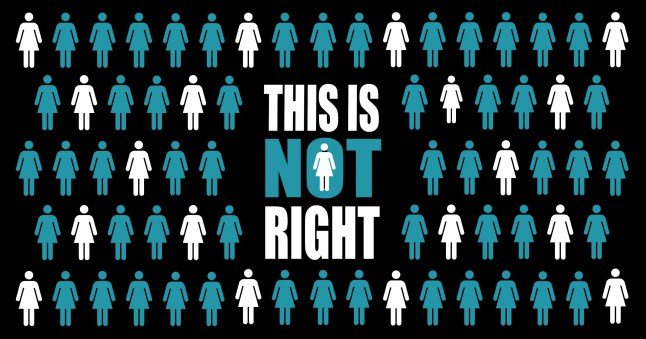To view this video please enable JavaScript, and consider upgrading to a web
browser that
supports HTML5
video
A woman was forced to leave her home and change her name to escape from her stalker – her father – only to be found by him.
Anna endured years of harassment, threats and stalking from her dad, who was out to ‘wreak havoc’ on the life she had built with her partner, Stuart.
He often used personas to target the couple over the phone or in letters, pretending to be a company owner and even a tabloid journalist.
Anna felt she had little choice but to pack up and leave her village after her stalker mailed letters full of ‘vile things’ about them to neighbours.
‘We thought he’s not going to be able to find us in the whole country,’ Anna said in a video shared yesterday by Cambridgeshire Police.
‘But he found us.’

Sometimes, the couple would be on the receiving end of ‘nasty’ phone calls. Other times, he wrote them threatening letters.
From her employer and neighbours to the local pub, there was barely a person in Anna’s life whom her father had not hounded.
‘It was over a long period of time, but it seemed to go in fits and bursts,’ said Stuart. ‘We’d receive several letters.’
In some letters, Anna’s dad wrote ‘abusive’ letters to his daughter pretending to be a private company they had hired.
This Is Not Right

On November 25, 2024 Metro launched This Is Not Right, a year-long campaign to address the relentless epidemic of violence against women.
With the help of our partners at Women’s Aid, This Is Not Right aims to shine a light on the sheer scale of this national emergency.
You can find more articles here, and if you want to share your story with us, you can send us an email at vaw@metro.co.uk.
Read more:
‘The pub over the road got a phone call from somebody who said they were a journalist from The Sun newspaper and started saying terrible things,’ Anna said.
The couple had long tried to ignore the harassment – maybe he would get bored, they hoped.
What is stalking?
Stalking is a crime that occurs when someone harasses or targets another person two times or more.
One in seven people has been a victim of stalking, according to official figures, a number higher among women and young people.
Yet on average, a victim will encounter 100 incidents of stalking before reporting it to the police.
Stalking and harassment can take many forms. Persistent phone calls, sending hostile texts and posting abusive messages on social media are some examples of harassment.
Stalking – where the stalker has an obsession with the person they’re targeting – can include turning up uninvited at someone’s home, spying on them or following them.
For victims, these acts cause long-lasting emotional distress as their lives become marked by fear and hypervigilance. Sometimes, stalking can take a toll on the body, including dizziness, headaches and heart palpitations.
There are many reasons why people stalk. The Stalking Risk Profile, a risk assessment guide for investigators, says motivations include rejection, power, loneliness, as well as indifference to the victim’s emotions.
But it was when he posted letters not only to the couple’s neighbours but the entire village that Anna and Stuart knew they had to escape.
‘We really started thinking seriously about what we need to do about this,’ Anna said.
Anna shared her story for National Stalking Awareness Week, which runs until Friday, to encourage victims to get support.
Anna said that she and Stuart had long discussed reporting the stalking to the police.
‘But every time we thought it would just be a red rag to a bull and that it would make him worse,’ she said.
‘We didn’t know how, once he’d been reported to the police, how we could react to what he would do.’

Stalkers, Anna stressed, are not just jilted ex-lovers or unrelenting pursuers.
‘It isn’t at all. It can be anybody,’ Anna said. ‘I’ve always felt reluctant, because it was my father to take action.’
Anna’s father received a one-year suspended prison sentence and a five-year restraining order.
The police said: ‘If this is happening to you, don’t feel the guilt – report it – call 101 or report it our webchat.
‘Stalking and harassment are serious crimes which can have a devastating effect on the lives of victims.’
Get in touch with our news team by emailing us at webnews@metro.co.uk.
For more stories like this, check our news page.


